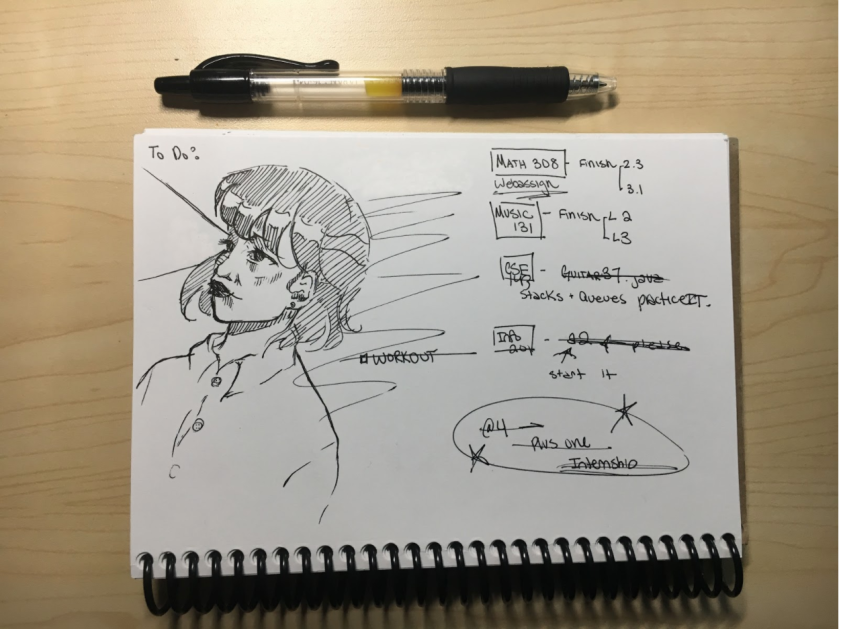Author: Olivia Tang
Whether it’s because of school, work, or a combination of both. Our professional and educational lives seem to get in the way of doing what we love!
Admittedly, when I started my first year of college I had trouble adjusting to the class structure and the freedom of choosing what to do with my time. Teachers in high school would spend more time on topics than professors in college. The pace of college classes was faster as well.
Being new to the college grind, I didn’t know how to allocate my time for my classes while also leaving time for fun and social life. This made it easy for me to think that I didn’t have any free time at all. Everything became more manageable after I started planning.

I started writing down all my tasks for the day into my sketchbook. I write everything I need to get done for the next week, and I circle all the important tasks I need to get done. I find that crossing off the tasks at the end of the day to be incredibly satisfying, and whenever I don’t have a spurt of motivation when I need it I use that time to draw in my sketchbook. It gives me more time to look at the to do list I’ve made for myself on the page and it also gives me time to do something I love, drawing! Psychologists say that 25% of our happiness comes from how we manage our own stress.
We feel happiness due to the effects of Dopamine, Oxytocin, Serotonin and Endorphins. Together these chemicals help design our own happiness. According to Nicole Lazzaro, a world-renowned game designer that specializes on gamifying experiences, each chemical that affects our happiness plays a different role in how we experience happiness.
Lazzaro explains that we typically think of Dopamine as the “happiness drug” when in reality dopamine more affects our feeling of anticipation. Oxytocin is the chemical that allows us to feel empathy, and we feel closer to close friends and family when it is released. Serotonin is a mood regulated, which means it is responsible for our good moods and our bad moods, and Endorphins are hormones that mask pain and discomfort and help us power through workouts and achieve our goals.(Buckner)
Stress depletes these chemicals. When we are stressed we produce the stress hormone, cortisol. Cortisol depletes our levels serotonin and dopamine–chemicals that affect our motivation, and susceptibility to depression and anxiety. It’s normal to deal with stress, but it is not easy to deal with. Psychologist, Robert Epstein says “The most important way to manage stress is to prevent it from ever occurring.”- which means planning ahead!
Sources:
Buckner, Clark. “4 Chemicals That Activate Happiness, and How to Use Them.”TechnologyAdvice. N.p., 18 Oct. 2017. Web. 01 Feb. 2018.
“Chronic Stress – The Effects On Your Brain.” Australian Spinal Research Foundation. N.p., 30 June 2016. Web. 01 Feb. 2018.
Peláez, Marina Watson. “Plan Your Way to Less Stress, More Happiness.” Time. Time, 31 May 2011. Web. 01 Feb. 2018.
 Author: Kelsey Fukuda
Author: Kelsey Fukuda


